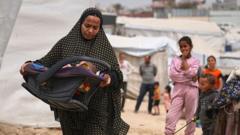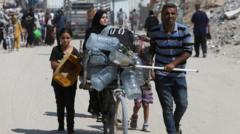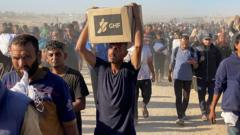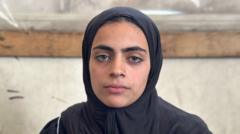"With the ongoing conflict, pregnant women in Gaza face unprecedented challenges, including severe malnutrition and limited access to medical care. As they confront overwhelming risks during pregnancy and delivery, the heartbreaking stories of loss and longing underscore the urgent need for support."
"Amid Chaos, Hope Unravels: Pregnancy and Childbirth Dangers In Gaza"

"Amid Chaos, Hope Unravels: Pregnancy and Childbirth Dangers In Gaza"
"As war ravages Gaza, the futures of mothers and newborns hang by a thread amidst acute shortages and overwhelming fear."
In Gaza, pregnancy and childbirth are emerging as alarming dangers for women yearning for new life amid relentless conflict. The ongoing war has brought acute shortages of food and medical supplies, with the United Nations reporting that one in ten newborns is born underweight or premature. Miscarriages and stillbirths are on the rise, escalating fears among expectant mothers like Malak Brees, who recently experienced significant loss of amniotic fluid. Struggling with malnutrition, women are often forced to consider the severity of their situations, as expressed by Malak: “It’s in the hands of God; the fetus could survive or die.”
The implications of Israel’s blockade have turned childbirth into a perilous endeavor, as insufficient medical supplies and ongoing hostilities mean many women are delivering in unsafe environments like tents or shelters. Sandra Adler Killen, a nurse who has worked on the ground, notes that mothers are often sent home shortly after delivery, with inadequate postnatal support, even for those who have undergone C-sections. Meanwhile, Nasser Hospital has been overwhelmed since a nearby facility was bombed, leaving many without proper care.
Access to routine prenatal checks has become increasingly rare, with an estimated 55,000 pregnant women in Gaza unable to receive necessary medical attention. Dr. Ahmad al-Farra highlights the psychological toll this uncertainty takes on mothers: the fear of low birth weight and complications looms large. One poignant story is that of Aya al-Skafi, who lost her four-month-old daughter, Jenan, to malnutrition. As supplies dwindled, Aya felt helpless, pleading for help but finding solace only in prayer.
The Gaza Infant Nutrition Alliance is stepping in, offering training to local healthcare workers on the importance of breastfeeding, even in dire conditions. Despite the grim realities, there are efforts to provide some level of support. Sandra recounts instances of mothers experiencing devastating losses amidst the chaos, where bombings disrupted their attempts to nourish and care for their newborns. Compounding these difficulties, many women lack the support networks typical in Gaza due to displacement.
The heart-wrenching account of Jomana Arafa illustrates the fragility of life in Gaza; despite a hopeful start with the birth of her twins, tragedy struck just days later when an Israeli strike claimed her and her newborns’ lives. This relentless cycle of violence has dramatically altered the expectations surrounding pregnancy, transforming what once was a joyous occasion into a harrowing ordeal fraught with anxiety and despair. In this environment, where loss and grief overshadow hope, the futures of mothers and their babies hang perilously in the balance.





















